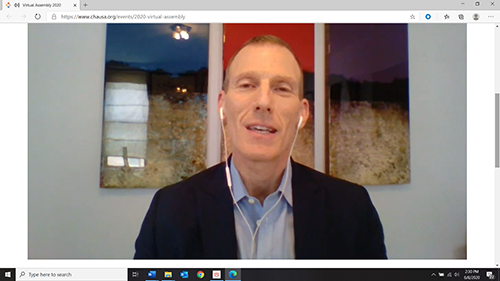Futurist Jamie Metzl says systemic reform is needed to protect the most vulnerable
By JULIE MINDA
June 9, 2020
In the view of futurist Jamie Metzl, the world will never be the same after the pandemic — it will be transformed either for the better or for the worse. Speaking as the keynote for CHA's virtual Catholic Health Assembly Monday, he said that it is incumbent upon the Catholic health ministry to advocate rebuilding that is done for the better — that is, in the name of the common good.
The world that existed before the pandemic "is not coming back, at least not in the same way it was," said Metzl. "And the question for all of us now is: Can we — while we fight this pandemic — can we begin to lay the foundation for the kind of world we would like to live in?"
He said the pre-pandemic world was replete with inequity and injustice, and society's most vulnerable were not protected. The nation and the world can come back from the pandemic with a much better system that provides protections for everyone, not just the advantaged.
Brokenness exposed
Metzl is a health care and technology futurist who has urged in numerous venues since the coronavirus outbreak that people and nations around the world seize upon this moment in history to work toward more just, equitable and sustainable systems.
In his address to about 700 Catholic health care leaders, Metzl said the pandemic has laid bare some of the many structural problems that exist in the U.S., including in the health care system. He said the coronavirus exposed that the country was not prepared to head off an avoidable pandemic. The virus also revealed "terrible weaknesses" in the public health infrastructure. And it exposed "underlying societal failures that have really weaponized inequality," he said. He pointed out that more poor people than wealthy people died from COVID-19.

Technology and health care futurist Jamie Metzl presents during the virtual Catholic Health Assembly. He called on the health care ministry to seize the moment to upset the status quo that allowed for health disparities and inequity.
Citing a recent column in the Washington Post co-written by Michelle Williams and Jeffrey Sanchez he said, "Racism is a public health challenge. Inequality is a public health challenge." Williams is an epidemiologist and dean of the faculty at the Harvard T.H. Chan School of Public Health. Sanchez is a lecturer at the school.
For better or worse?
Referring to a concept introduced earlier in the virtual assembly by CHA President and Chief Executive Officer Sr. Mary Haddad, RSM, Metzl said that the nation stands at a "threshold moment," and "we don't know — will the new world be better or worse?"
"It's so essential that at these threshold moments we do everything we can to go forward to a better place," he said, "and I know that is what your ministry is all about."
Metzl said the Catholic Church elevates the protection of human dignity, the quest for justice and the provision of holistic care. He said the ministry must advocate to ensure that such values undergird the foundations as the nation emerges from the pandemic and rebuilds.
Metzl said, "While we do all that we possibly can do to heal and respond to this crisis, we all now have a much bigger role and obligation — we need to think systemically" about a rebuilt nation and advocate for the right kind of change.
For instance, he said, the ministry has to "think systemically about structural deficiencies driving differential health outcomes, to think systemically about how to fix a broken health care system to provide not just more equity but also to provide better care for everyone."
Humane use of technology
Metzl noted that this opportunity for meaningful, positive change comes in the midst of technological and related genetic revolutions that are transforming the way people understand "health" and "health care." For the first time, providers have the ability to harness the power of genetic engineering, artificial intelligence and other breakthrough science to make dramatic changes to people's health outcomes.
This technology can be used either for the betterment of all people, or not, Metzl said. He said the Catholic health ministry should use its collective voice to ensure that those making decisions about the deployment of new technology respect human dignity and the common good.
He said, "What are the values we use to guide our technology — that is the issue — and whose voice is heard in determining how these technologies will be used?"
Collective well-being
Metzl said that the pandemic has shown the world that there is a deep level of interconnection and interdependence among all people.
He said the impact of coronavirus has illustrated that it's not simply an act of charity to help other people — helping others can be "the best investment we can each make in our collective well-being." By protecting the most vulnerable from danger, groups of people simultaneously guard the collective whole from danger.
He said this is the type of thinking that should prevail as society reimagines a different health system. "In a threshold moment, we are all called upon to do something bigger. I believe to my core this is one of those moments and the Catholic health care community — which has done so much to help provide essential care to the most vulnerable people — you among others have a unique responsibility to think systematically.
"History will judge each of us and all of us — are we living up to our principles? This is our moment, and we all need to step through that door," he said.